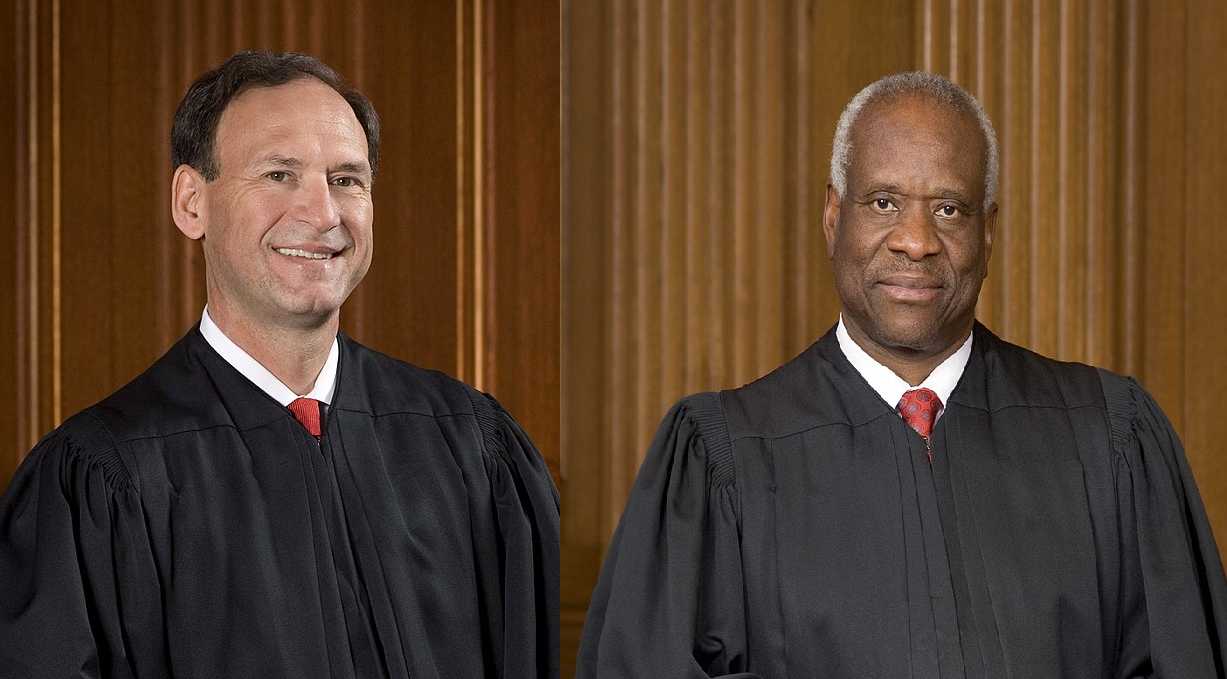SUPREME COURT JUSTICES ALITO & THOMAS WARN “PREPOSTEROUS” RULING BARRING EMPLOYERS FROM FIRING MEN IN DRESSES IS A “THREAT” TO RELIGIOUS LIBERTY
BY HEATHER CLARK
republished below in full unedited for informational, educational & research purposes:
 WASHINGTON — In their dissent from this week’s Supreme Court ruling reading sexual orientation and gender identity into the meaning of “sex” in federal civil rights law, Justices Samuel Alito and Clarence Thomas called the decision a “brazen abuse of authority” and opined that it is “preposterous” for the court to claim that it only interpreted the statute rather than bypassed the legislature.
WASHINGTON — In their dissent from this week’s Supreme Court ruling reading sexual orientation and gender identity into the meaning of “sex” in federal civil rights law, Justices Samuel Alito and Clarence Thomas called the decision a “brazen abuse of authority” and opined that it is “preposterous” for the court to claim that it only interpreted the statute rather than bypassed the legislature.
The two also expressed concern about what the ruling might mean for religious liberty from a variety of aspects — from the employment practices of churches, to the moral standards for workers at Christian schools, to the rights of doctors who decline to perform sex-change-related operations.
“Usurping the constitutional authority of the other branches, the court has essentially taken H. R. 5’s provision on employment discrimination and issued it under the guise of statutory interpretation,” Alito wrote, being joined by Thomas in his dissent. “A more brazen abuse of our authority to interpret statutes is hard to recall.”
“The court tries to convince readers that it is merely enforcing the terms of the statute, but that is preposterous,” he continued. “Even as understood today, the concept of discrimination because of ‘sex’ is different from discrimination because of ‘sexual orientation’ or ‘gender identity.’ And in any event, our duty is to interpret statutory terms to ‘mean what they conveyed to reasonable people at the time they were written.'”
“The court may wish to avoid this subject, but it is a matter of concern to many people who are reticent about disrobing or using toilet facilities in the presence of individuals whom they regard as members of the opposite sex,” he noted, adding that the definition of “transgender” could even “apply to individuals who are ‘gender fluid,’ that is, individuals whose gender identity is mixed or changes over time.”
“The Court’s decision may lead to Title IX cases against any college that resists assigning students of the opposite biological sex as roommates,” Alito also worried. “A provision of Title IX allows schools to maintain ‘separate living facilities for the different sexes,’ but it may be argued that a student’s ‘sex’ is the gender with which the student identifies.”
He and Thomas likewise expressed concern over the ramifications for religious liberty, writing, “As the briefing in these cases has warned, the position that the court now adopts will threaten freedom of religion, freedom of speech, and personal privacy and safety. No one should think that the court’s decision represents an unalloyed victory for individual liberty.”
Alito said that various religious groups, including Christians, had filed briefs in the consolidated cases, fearing that an adverse ruling “will trigger open conflict with faith-based employment practices of numerous churches, synagogues, mosques, and other religious institutions.”
“They argue that ‘[r]eligious organizations need employees who actually live the faith,'” Alito outlined, “and that compelling a religious organization to employ individuals whose conduct flouts the tenets of the organization’s faith forces the group to communicate an objectionable message.”
Alito noted that Christian schools similarly have moral standards for employees, but under the ruling, those standards may be meaningless if able to be flouted, and workers may be able to sue if they are let go for violating the lifestyle covenant.
“A school’s standards for its faculty ‘communicate a particular way of life to its students,’ and a ‘violation by the faculty of those precepts’ may undermine the school’s ‘moral teaching.’ Thus, if a religious school teaches that sex outside marriage and sex reassignment procedures are immoral, the message may be lost if the school employs a teacher who is in a same-sex relationship or has undergone or is undergoing sex reassignment,” he explained.
“Yet today’s decision may lead to Title VII claims by such teachers and applicants for employment,” Alito lamented.
He also pointed out that transgenders have filed suit for being denied sex change operations, and “[s]uch claims present difficult religious liberty issues because some employers and healthcare providers have strong religious objections to sex reassignment procedures, and therefore requiring them to pay for or to perform these procedures will have a severe impact on their ability to honor their deeply held religious beliefs.”
Alito further expressed concern that employers and co-workers may be required to address those who identify as transgender by their preferred pronoun, and “[t]he court’s decision may also pressure employers to suppress any statements by employees expressing disapproval of same-sex relationships and sex reassignment procedures.”
“Employers are already imposing such restrictions voluntarily, and after today’s decisions employers will fear that allowing employees to express their religious views on these subjects may give rise to Title VII harassment claims,” he worried.
“Although the Court does not want to think about the consequences of its decision, we will not be able to avoid those issues for long. The entire Federal Judiciary will be mired for years in disputes about the reach of the court’s reasoning,” Alito said.
Read the dissent on page 38 of the ruling here.
BACKGROUND
 As previously reported, the Supreme Court issued its 6-3 ruling on Monday morning, concluding that a section of the Civil Rights Act of 1964, known as Title VII, which bars job discrimination on the basis of sex, among other traits, may be read to include homosexual and “transgender” employees.
As previously reported, the Supreme Court issued its 6-3 ruling on Monday morning, concluding that a section of the Civil Rights Act of 1964, known as Title VII, which bars job discrimination on the basis of sex, among other traits, may be read to include homosexual and “transgender” employees.
“An employer who fires an individual for being homosexual or transgender fires that person for traits or actions it would not have questioned in members of a different sex. Sex plays a necessary and undisguisable role in the decision, exactly what Title VII forbids,” Justice Neil Gorsuch wrote for the court.
He and “conservative” Justice John Roberts joined the liberal justices on the bench to form the majority 6-3 ruling.
Justice Brett Kavanaugh dissented, as well as Alito and Thomas, but applauded the result as an “important victory” that homosexuals can “take pride in.”
One of the three cases before the court surrounding the issue involved R.G. & G.R. Harris Funeral Homes, an explicitly Christian home that was sued after firing a male employee who wanted to begin wearing a skirt uniform for work as he was diagnosed with “gender dysphoria.”
“R.G. & G.R. Harris Funeral Homes recognize that its highest priority is to honor God in all that we do as a company and as individuals,” the company’s website states. It also features a quote from Matthew 6:33, in which Jesus taught that men should “seek first the kingdom of God and His righteousness.”
Because owner Thomas Rost Rost did not feel comfortable with providing a skirt suit due to his Christian convictions, Stephens was let go.
Stephens consequently took the matter to the federal Equal Employment Opportunity Commission (EEOC), which sued Rost with the aid of the American Civil Liberties Union (ACLU) in alleging gender discrimination.
“R.G. employees understand that the dress code requires funeral directors to wear company-provided suits,” attorneys for Rost outlined in a legal brief. “Rost sincerely believes that he would be violating God’s commands if he were to pay for or otherwise permit one of RG’s funeral directors to wear the uniform for members of the opposite sex while at work.”
A federal court ruled against Rost, but the Sixth Circuit overturned the decision. The matter was then appealed to the U.S. Supreme Court. Stephens died last month following a lengthy battle with kidney disease.
